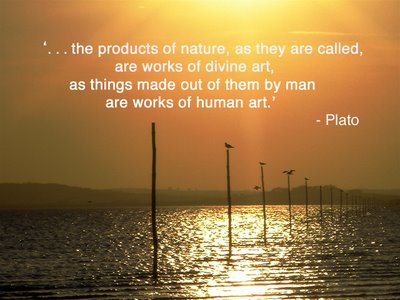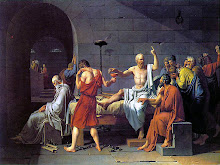
There was once a man who invented the art of making fire. He took his tools and went North to a tribe where it was dark and cold. Where people were easily separated.
So he taught them how to make fire, and they were very interested. Because it was new, and now they could keep warm and see one another, now they could cook, now they had a love and freedom they had never known, things were easier, and they were aware of all sorts of things which had previously been taken for granted. But before they could express their gratitude to the man, he disappeared. He didn’t want recognition, he wanted their well being. So he moved on to another tribe.
They were interested too, a bit too interested as far as the Priests and Politicians were concerned, because they were losing popularity, as the fire-making man and his invention kept drawing in the crowds.
So they decided to do away with the man, and they had him killed. But they were afraid that the people might turn on them. And as they were wise, and even wily, they had a portrait of the fire maker made, and they mounted his image on the wall, and the man’s fire making instruments were mounted and put onto an altar, and the tribes-people were taught to revere the man’s portrait and revere the altar with his symbols on it. A book was written all about the man and his fire, and liturgy was written all about the book. Songs were sung and sermons exhorted people to venerate the man. This went on for centuries, while the fire died out.
So what are we to make of the torture of a fire bringer like Jesus, on a day we even call ‘Good’?
A couple of years ago I met a man who knew the answer. He was successful. But one night he had beaten and kicked another man almost to death in a bar. In his rage and fear and adrenaline he had run home and found a police-car in the street. But, as it turned out, the police officers had come for one of his neighbours. So he was relieved, and he was guilty, and this is what he made of Good Friday:
Human beings, he said, break God’s law. Jesus is punished in their place, and justice is restored. Simple. At least it was for him – after all it is in the Bible and the liturgy.
Before I met him, I picked up a very popular book by high profile Christian in one of those marvelous Borders book and coffee shops in a retail park. But this Christian had a rather different take on Good Friday. If God really sends his son to be tortured, he argued, it is hardly Good News. Abraham may have been ready to do it to Isaac in the days we still offered human sacrifices, but not many of us are ready to do it now. We’d be locked up, and rightly so. So actually it sounds more like cosmic child abuse. AND OH what a fuss followed this book’s release. But the point was made. Good Friday means many things.
What you need saving from may not be what I need saving from. This morning’s morning prayer contained the line: “Save me from the horns of wild Oxen.” There aren’t too many of those around here. Times change, and most of us look at God’s world through our own cultural filters, and not as it is.
Consider psychometric testing, which shows us 16 basic ways of perceiving the world through a personality. The extrovert thinks he needs to be saved from the introvert, the activist thinks she needs to be saved from the contemplative, and so on.
Or consider the Capitalist who thinks the world needs saving from the Communist, and vice versa. Or how one man’s terrorist has been another man’s freedom fighter. There are no “our boys” and “their boys”, from God’s perspective. It’s our partiality which separates people. Consider someone you think is to blame. You can be fairly sure they disagree.
You may enjoy eating beef, but an Indian perceives the eating of a cow with horror, in the same way you might perceive the eating of a pet dog. Some Koreans perceive dog eating as a delicacy. Jews and Muslims don’t enjoy bacon like Christians might. And all this is nothing to do with beef, bacon or dog meat, and everything to do with human conditioning and perception.
Christ’s truth isn’t what we think it is. We need more than perceptions, we need fire and light and truth. Do we have access to fire and light and truth and awareness, or are we venerating perceptions on an altar, in a book, a creed, or a song.
And what on this earth are we going to make of the torture of a fire bringer like Jesus on a day we are supposed to call Good?
If we look to scripture, it tells us how he died for our sins, and the creed we recite also tells us that for our sake he was crucified, suffered death and was buried.
But the Church in its wisdom has never tried to define how 'for our sake' works. Jesus satisfies the righteous wrath of God, Jesus is victorious over death and evil, Jesus is a ransom in a deal to trick the devil, Jesus demonstrates and models God’s love, all these theories say more about us than about the fire.
Can you imagine trying to communicate Good Friday to someone who has never been to Church, who didn’t go to a Church school, and who has never read a Bible. If it’s still true, it must be worth a go:
“So you say Jesus had to die. But don’t we all have to die?” Well yes, but Jesus was crucified. “So you say Jesus had to be crucified?. But weren’t lots of other people crucified?” Well yes, but Jesus’ death was necessary, not accidental. “So you say Jesus’ death was necessary because of my sin. But I don’t feel sinful. And I’m doing the best I can with what I have been given.” And so on.
Jesus’ death was inevitable. Worldly power doesn’t like awakened people bringing fire and light. They redefine what it is to be human, and our vested interest is threatened.
So what would Jesus do with the Church today?
Perhaps he would say what he said to Pilate: "My kingdom doesn't consist of what you see around you … I entered the world so that I could witness to the truth. And everyone who cares for truth, who has any feeling for truth, recognizes my voice."
When we see a situation, or a person, not as we imagine them to be, or as we would like them to be, but as they really are , this is salvation, a freshness, now.
Jesus said: “Blessed are the pure in heart, for they shall see God.” Jesus didn’t say: “Blessed is my heart.”
We are to be full of death, and see Life as he saw it. Because alive people die to past and future and enter the present, surrounded by eternal life.
And relieving a guilty conscience, like my friend after the bar room beating, is a start, but we’re not called to manufacture more guilt, although you might not know it from some of our liturgy.
A Roman Catholic friend of mine tells me the numbers of people attending confessional is falling, because they just don’t want to be making things up to confess.
We’re called, not to a restored conscience, but a restored consciousness. Here’s why:
"You won't talk?” said Pilate “Don't you know that I have the authority to pardon you, and the authority to crucify you?”
Jesus replied: "You haven't a shred of authority over me, except what is given you from heaven.
It’s like the story about the invading army taking charge of the monastery. The monks all run scared, except for one defiant monk. So the army general finds him, and stares into his eyes. He puts a sword against the monk’s throat, and he says: “Why aren’t you scared? Perhaps you don’t realize I am able to cut your throat without blinking?” The monk looks back and replies: “And perhaps you don’t realize I am able to let you cut it without blinking?” The general walks away.
Jesus was fully aware, and so he could do no wrong. “Why do you call me Lord,” he said, “and not do what I say?”.
He didn’t think he was any better than you or I. He was just the fire. I don’t love Christ because I feel inadequate or guilty or fearful about the fire, or because I think you should.
From our childhood we grow, and we gain knowledge of good and of evil, just like Adam and Eve. Fresh formless wonder is replaced by words and formulas and concepts, which are all useful, but which bring partiality. Jesus invites us to return to the child’s state, the aware and whole state, but without being a child. Return to paradise, give the apple back, wake up, which is what repent means. Watch, as he said in Gethsemane. Keep noticing every sensation and scene.
Good Friday is not clinging to labels. That’s just a game of self preservation, a bit like Johnny walking through Belfast when he feels a revolver against the back of his head. “Catholic or Protestant” says the voice behind him. Quick as a flash Johnny says: “I’m a Jew.” “Sure I’m the luckiest Arab in Bel-fast.” says the voice.
With Jesus’ kind of life, you have no place to lay your head. A spade is a spade, a whitewashed tomb is a whitewashed tomb, but if you have the fire, forgive ignorant people, even from the cross. In unawareness, they know not what they do, because they can’t yet do anything else.
A group of us sat in the pub recently and we imagined the lowest points of our lives.
If we imagine our problems from the point of view of death, none of them seem to matter. I’m doing so many funerals at the moment I am almost constantly reminded about how Jesus embraced death long before Good Friday ever got to him. Jesus said that people should let the dead bury their own dead. What did he mean by that?
He meant, I think, that we’re not really living until it doesn’t matter whether we live or die. At that point we can live. When you’re ready to lose your life, then you live. But if you’re protecting it, you’re already dead.
Even St Augustine said Jesus Christ could do nothing for many of his hearers. God cannot be conceived, as it is written in Corinthians 2 – “No eye has seen, no ear has heard, no mind has conceived what God has in store for those who love him.”
But Good Friday is God’s Friday, when God was absorbed into the wordly whirlwind of vested interest. Jesus died for our sin, but that’s still a formulae. It means Jesus died because of our separation, and so will many more people die because of our separation.
Live and die embracing death every moment, the death of preconceived ideas about life and other people and yourself, the death of attachments to the world you love. Jesus loved the world, but he wasn't attached to it. Bring death into life, here and now, in the fire of awareness, the life of wonder and wholeness.
St Paul says it so well in 2 Corinthians 4:10: “We are always carrying around in our body the death of Jesus, so that the life of Jesus may be revealed.”
God’s Life is
your fullest life.
Amen.
































































































